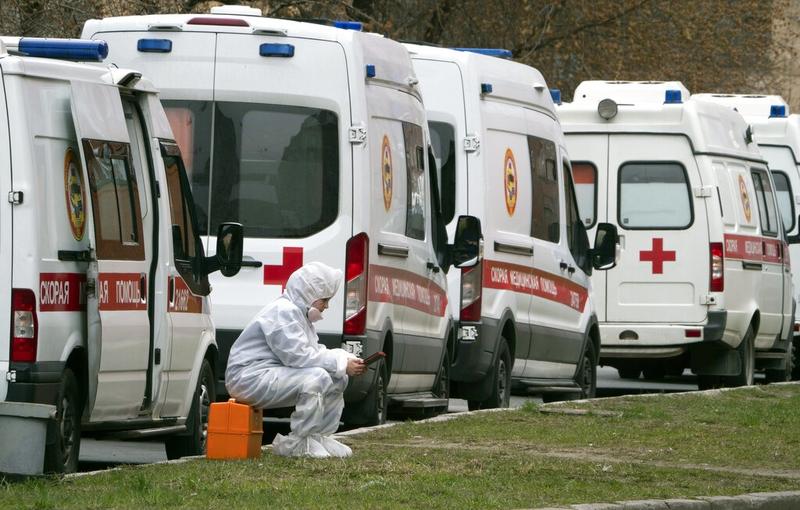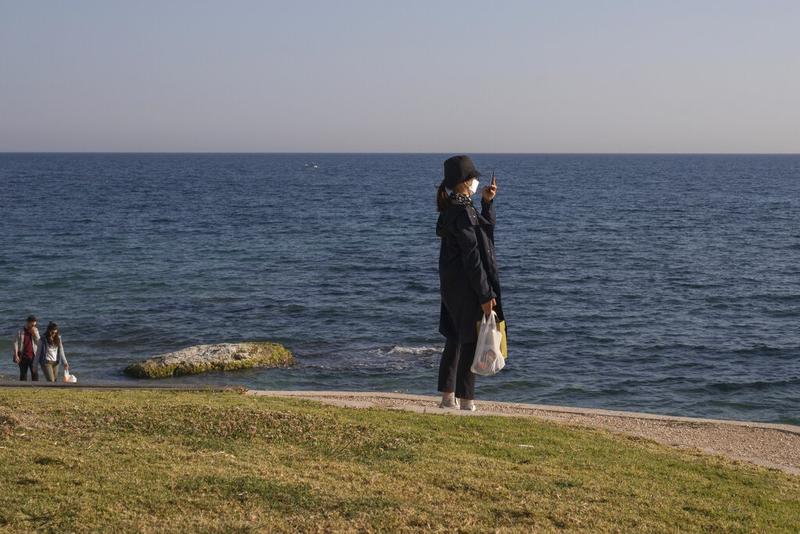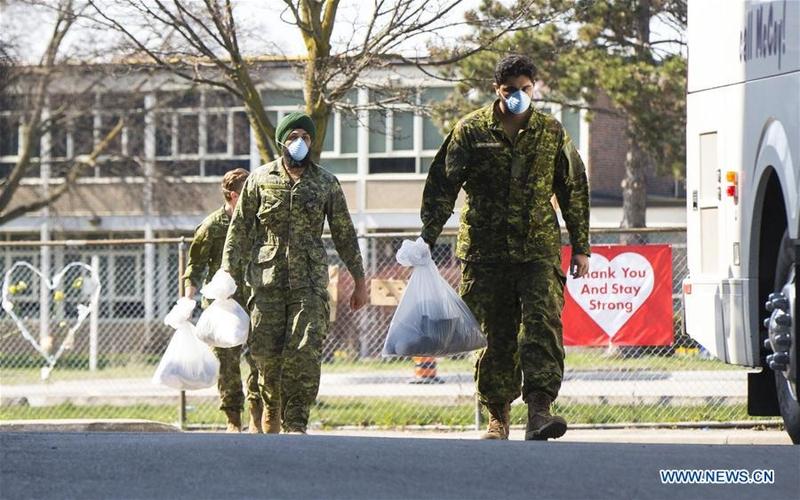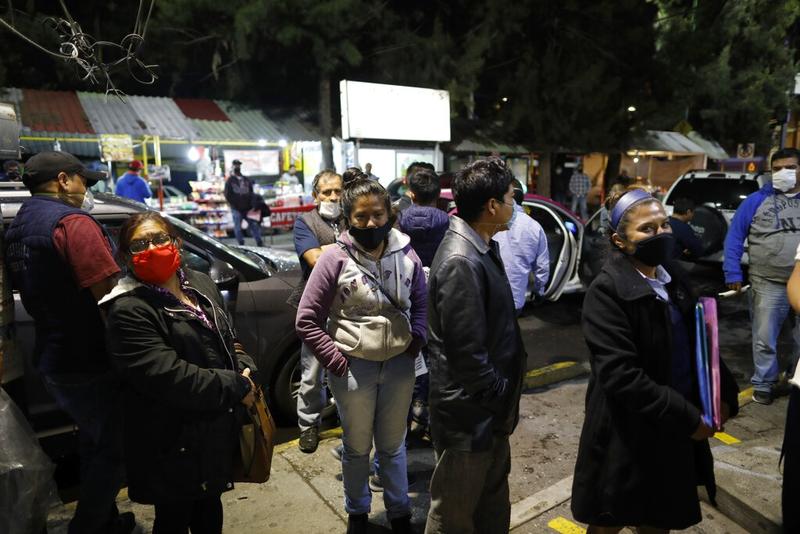 A medical worker wearing protective gear takes a rest near ambulances standing in line to deliver patients suspected of being infected with the coronavirus to the Pokrovskaya hospital, in St.Petersburg, Russia, April 28, 2020. (DMITRI LOVETSKY / AP)
A medical worker wearing protective gear takes a rest near ambulances standing in line to deliver patients suspected of being infected with the coronavirus to the Pokrovskaya hospital, in St.Petersburg, Russia, April 28, 2020. (DMITRI LOVETSKY / AP)
MEXICO CITY / BLANTYRE / MADRID / PARIS / WASHINGTON / ATHENS / LONDON / MOSCOW / GENEVA / OTTAWA / ROME / JUBA / MOGADISHU / CAIRO / WARSAW / BISSAU - Russia's nationwide tally of confirmed coronavirus cases neared the 100,000 mark on Wednesday after 5,841 new cases of the virus were registered overnight along with a record daily rise in the death toll.
Russia, the world's largest country by territory, has been on lockdown since President Vladimir Putin announced the closure of most public spaces in late March.
Russia's nationwide case tally now stands at 99,399 after 5,841 new cases of the virus were registered overnight along with a record daily rise in the death toll
It this week overtook China and Iran in the number of confirmed cases. The figures mean Russia now ranks eighth worldwide for the number of confirmed cases, though it has so far recorded far fewer deaths than many of the most hard-hit countries.
The nationwide case tally now stands at 99,399, the country's coronavirus crisis response centre said on Wednesday. It said 108 people diagnosed with the novel coronavirus had died
Putin on Tuesday extended lockdown measures for another two weeks until May 11, while ordering his government to begin preparations for guidelines for the gradual easing of curbs from May 12, as well as to deliver a fresh emergency economic support plan, the third so far, to soften the impact of the virus.
 Staff at Waterloo Station in London, stand to observe a minute of silence to pay tribute to the National Health Service (NHS) and key workers who have died from COVID-19. On April 28, 2020. (KIRSTY WIGGLESWORTH / AP)
Staff at Waterloo Station in London, stand to observe a minute of silence to pay tribute to the National Health Service (NHS) and key workers who have died from COVID-19. On April 28, 2020. (KIRSTY WIGGLESWORTH / AP)
UK
Britain is on track to record one of the worst coronavirus death tolls in Europe, after data published on Tuesday showed nationwide fatalities topped 24,000 nine days ago.
However, opposition Labour Party leader Keir Starmer said on Wednesday believed the toll is probably higher than 27,24, as he questioned the government’s response to the outbreak.
A day after Prime Minister Boris Johnson spoke of success in dealing with the outbreak, the new figures showed the week ending April 17 was Britain's deadliest since comparable records began in 1993.
The Office for National Statistics (ONS) said 21,284 people had died in England by April 17 with mentions of COVID-19 on their death certificate. Together with figures from Scotland, Wales and Northern Ireland, the total United Kingdom death toll was at least 24,000 as of April 19.
Data from the Office for National Statistics showed UK's fatalities topped 24,000 nine days ago. A toll of more than 24,000 puts the UK among the worst-hit in Europe, exceeding France
Unlike the hospital death tolls announced daily by the government, Tuesday's ONS figures include deaths in community settings, such as care homes where overall fatalities have trebled in a few weeks.
Health Secretary Matt Hancock said on Tuesday that daily figures for deaths in the community would be published from Wednesday.
Overall, Tuesday's figures for COVID-19 deaths in England and Wales up to April 17 were more than 50 percent higher than the daily toll for deaths in hospitals initially announced by the government.
A UK death toll of more than 24,000 puts it among the worst-hit in Europe, exceeding France - which also counts deaths in care homes - by around 5,000 at that point in time.
ALSO READ: Healthy again, British PM says too risky to relax lockdown yet
The latest daily figures released by Britain's health ministry for COVID-19 deaths in hospitals hit 21,678 on Tuesday, a rise of 586.
Hancock said Britain's daily testing capacity is up to 73,400 now and the government is "on track" to meet the target of 100,000 tests per day by the end of this month.
The UK government is around three weeks from releasing the tool it says is essential to easing the current coronavirus lockdown, Hancock said, in a sign current restrictions are likely to largely continue until at least the second half of May.
The government has said it sees a “test, track and trace” system as the way to ensure that COVID-19 infections don’t take off again as the lockdown is eased. That requires the recruitment of 18,000 “contact tracers” to identify people who might have been exposed to the virus, as well as the release of a mobile phone app that will do part of that job automatically.
 A group of hikers with half of their faces covered with a cloth as a precaution against the coronavirus masks are seen under the Hollywood sign in Los Angeles, April 28, 2020. (MARCIO JOSE SANCHEZ / AP)
A group of hikers with half of their faces covered with a cloth as a precaution against the coronavirus masks are seen under the Hollywood sign in Los Angeles, April 28, 2020. (MARCIO JOSE SANCHEZ / AP)
US
Over 1 million people in the United States have been infected with COVID-19, with the death toll exceeding 57,000 on Tuesday, according to latest data.
As of Tuesday afternoon, the US tally reached 1,002,498, with a total of 57,266 deaths, according to the Center for Systems Science and Engineering (CSSE) at Johns Hopkins University.
New York remains the hardest-hit state, with 291,996 cases and 22,668 deaths, followed by New Jersey where 111,188 cases and 6,442 deaths have been reported. Other states with over 40,000 cases include Massachusetts, Illinois, California and Pennsylvania, according to the CSSE.
The number of sailors who have tested positive for COVID-19 aboard US Navy destroyer, the USS Kidd, rose to 64 as the warship on Tuesday afternoon docked at a naval base in San Diego, California, local media reported.
The warship has a crew of around 300, and by Tuesday afternoon, 63 percent of the crew had been tested, according to a report from the Daily Herald.
President Donald Trump said in a Twitter post that “the only reason the U.S. has reported one million cases of CoronaVirus is that our Testing is sooo much better than any other country in the World.”
He continued: “Other countries are way behind us in Testing, and therefore show far fewer cases!”
READ MORE: No evidence antibodies protect from 2nd infection, says WHO
Meanwhile, Trump on Tuesday ordered meat-processing plants to stay open to protect the food supply in the United States, despite concerns about coronavirus outbreaks, drawing a backlash from unions that said at-risk workers required more protection.
With concerns about food shortages and supply chain disruptions, Trump issued an executive order using the Defense Production Act to mandate that the plants continue to function.
In another development, lawmakers in the US House of Representatives will not return to Washington next week as planned, due to the continuing risk of coronavirus infection, Democratic leaders said.
In California, Governor Gavin Newsom said curbside retail, manufacturing and other "lower-risk workplaces" should reopen within weeks as coronavirus testing and tracing improves. Schools could start their 2020 year as early as July to make up for a "learning loss" from closures and to allow the broader workforce to return to work, Newsom said.
Global tally
Global COVID-19 cases topped 3.1 million and the global death toll is now more than 217,000, according to latest data from the Center for Systems Science and Engineering (CSSE) at Johns Hopkins University.
The United States has reported the most number of confirmed coronavirus cases and deaths. Trailing behind the US in caseload are Spain and Italy.
Other countries with over 100,000 cases include France, Germany, the United Kingdom and Turkey, according to the CSSE.
Belarus
Belarus reported 973 new COVID-19 confirmed cases on Wednesday, raising its total to 13,181, according to the country's health ministry.
The ministry said on Wednesday that 2,072 patients have recovered, while 84 patients with chronic diseases have died from the virus.
As of Wednesday, nearly 169,000 tests for COVID-19 infection have been conducted across the country, of which 7.8 percent were positive, said the ministry.
Belgium
A further 170 people had died of COVID-19 in the last 24 hours in Belgium, taking the country's death toll to 7,501, according to fresh figures from the public health institute Sciensano on Wednesday.
Of the 170 new deaths, 69 occurred in hospitals and 98 in rest homes and care homes, according to Sciensano. Of the cumulative 7,501 deaths, 46 percent have occurred in hospitals while 53 percent in rest homes and care homes.
Belgium also confirmed 525 new cases of infection in the last 24 hours, bringing the total cases to 47,859, according to Sciensano.
Also in the 24 hours, 174 more people were admitted to hospital, a slight increase against the previous day. And 340 more people left the hospital cured, raising the total number of recoveries to 11,283.
Italy
The coronavirus pandemic has claimed 27,359 lives in locked-down Italy, bringing the total number of infections, fatalities and recoveries to 201,505 as of Tuesday, according to the latest data released by the country's Civil Protection Department.
The daily death toll reported on Tuesday was 382, bringing the total to 27,359 fatalities since the pandemic first broke out in the northern Lombardy region.
The department reported 2,091 new infections and 2,317 more recoveries compared to Monday, bringing the nationwide totals to 105,205 and 68,941, respectively.
Spain
The number of new Spanish coronavirus cases and deaths held steady at low rates as the country prepares to ease some restrictions on public life.
The number of fatalities rose by 325 to 24,275 in the 24 hours through Wednesday, according to data from the health ministry. The total also includes another 128 previously uncounted deaths. Confirmed cases increased by 2,144 to a total of 212,917.
The latest figures on new infections reflect updated reporting standards adopted in recent days. Previously, the government included people who had virus antibodies in its overall figure, but now the daily total only includes patients who are confirmed positive using a testing technique known as PCR.
Spain announced a four-phase plan on Tuesday to lift one of the toughest coronavirus lockdowns in Europe and return to normality by the end of June.
Prime Minister Pedro Sanchez said restrictions that have halted public life since March 14 and nearly paralysed the economy will be gradually lifted from May 4 and vary from province to province.
READ MORE: Euro area's seven years of growth give way to record slump
France
French government spokeswoman Sibeth N’Diaye said a second wave of the virus in France is likely if residents don’t abide by the strict rules of the current lockdown.
The planned end of the lockdown on May 11, as detailed on Tuesday by Prime Minister Edouard Philippe, will depend on data regarding the virus, she said.
France's coronavirus deaths reached 23,660 as of Tuesday, an increase of 367 in the past 24 hours, according to the health ministry.
In a statement, the ministry said confirmed cases were up 1,520 at 129,859. Over the past 15 days, the 3,000 daily threshold has been crossed only twice and, on average during that period, the figure rose daily by 2,119.
Philippe said Tuesday that France would adopt an aggressive doctrine on COVID-19 testing from May 11 so that it can slowly unwind its lockdown and avoid economic meltdown.
The planned timeline hinged on the number of new infections remaining below 3,000 per day, the prime minister said.
READ MORE: France to begin easing virus curbs with plan to reopen shops
 A customer wearing a protective mask shops in a supermarket in Cologne, Germany, April 28, 2020. (ULRICH HUFNAGEL / XINHUA)
A customer wearing a protective mask shops in a supermarket in Cologne, Germany, April 28, 2020. (ULRICH HUFNAGEL / XINHUA)
Uganda
Uganda banned interstate truckers from checking into hotels and ordered they break only at selected points in a bid to curb the coronavirus outbreak.
Cargo will continue to be moved across the national borders, but drivers can’t stop at hotels, lodges or homes, President Yoweri Museveni said in a televised speech on Tuesday. It will be a “mobile quarantine” and they will only stop to rest at “designated places,” Museveni said.
Museveni also announced that only one driver will be allowed per truck and not three as earlier permitted. He especially urged women to resist meeting with the travelers and avoid the risk of contagion.
While the East African nation has only confirmed 79 COVID-19 cases after 20,329 tests, the government is concerned that movers of cargo into and out of the landlocked country could become super spreaders.
Germany
Germany reported that the number of new cases rose for the first time in three days as the government weighs whether to relax some restrictions.
There were 1,154 additional infections in the 24 hours through Wednesday morning, taking the total to 159,912, according to data from Johns Hopkins University. Fatalities rose by 188 to 6,314. The death rate climbed to 3.95 percent from 3.86 percent a day earlier.
Chancellor Angela Merkel is scheduled to consult with state premiers on whether to further relax restrictions on public life. North Rhine-Westphalia Premier Armin Laschet tried to lower expectations, telling the Funke media group that “we won’t discuss any major steps to ease the measures until May 6 at the earliest.”
Germany’s government will extend a travel warning for tourist trips abroad “until further notice” and at least until June 14, Spiegel reports, without saying how it got the information.
It’s unclear whether trips will be possible during the summer holidays, which start in late June in in some parts of the country.
Poland
Poland will reopen hotels and shopping malls on May 4 while it will consider reopening pre-schools on May 6, Poland's Prime Minister Mateusz Morawiecki said on Wednesday, in a move to ease restrictions imposed to stop the spread of the coronavirus.
Poland started relaxing some curbs earlier in April, saying they were costly for the economy. It has reopened forests and parks and eased rules on the number of customers in shops.
By Wednesday, Poland had reported 12,415 cases and 606 deaths.
Ireland
Irish Prime Minister Leo Varadkar said Tuesday that the new coronavirus levels in the country are not low enough to allow any easing of restrictions on May 5, the date when the current lockdown measures in Ireland are supposed to end, according to local media reports.
To date, Ireland has a total of 19,877 confirmed COVID-19 cases and 1,159 deaths, after reporting an additional 229 cases and 59 deaths, according to the Irish Department of Health.
Netherlands
The number of deaths from COVID-19 in the Netherlands has increased by 48 to 4,566 as of Tuesday, the National Institute for Public Health and the Environment (RIVM) announced.
It was the second day in a row that the daily reported deaths stayed under 50.
A total of 171 new infections were reported on Tuesday, bringing the total to 38,416.
Switzerland
The Swiss government will restrict events with more than 1,000 people until the end of August, it said on Wednesday, even as it announced the easing of some other restrictions on brother controls, sporting events, shops, restaurants and museums.
Some border restrictions will also begin being eased from May 11, it said. Moreover, professional sports teams can resume play on June 8, the government added, though without spectators.
It will decide on events of less than 1,000 people on May 27. At this stage, gatherings are limited to five people.
The epidemic curve continued to stabilize in Switzerland as the country saw an increase of 100 coronavirus cases on Tuesday, the smallest number in the past seven weeks, bringing its total tally to 29,264.
 A woman wearing a face mask to protect against the spread of the coronavirus take a picture with her mobile phone in the Alimos suburb of Athens, Greece, April 28, 2020. (PETROS GIANNAKOURIS / AP)
A woman wearing a face mask to protect against the spread of the coronavirus take a picture with her mobile phone in the Alimos suburb of Athens, Greece, April 28, 2020. (PETROS GIANNAKOURIS / AP)
Greece
Greek Prime Minister Kyriakos Mitsotakis said on Tuesday restrictions on citizens' movements would be lifted and more shops allowed to reopen from May 4 in a gradual easing of a lockdown imposed to curb the spread of the new coronavirus.
Although most restrictions on Greeks' free movement will be lifted on May 4, they will not be allowed to leave their wider region of residence, Mitsotakis said.
Some retail stores, including book shops and hair salons, will reopen on May 4 and others later in the month. Schools will open gradually, starting on May 11.
Year-round hotels, restaurants, cafes and shopping malls will reopen on June 1, but social distancing rules will apply and staff will have to wear masks.
The health ministry announced on Tuesday 32 new COVID-19 cases and two more deaths, raising the country's tally to 2,566 and the death toll to 138.
Slovenia
The Slovenian government on Tuesday announced further relaxations of restriction measures imposed to contain the coronavirus epidemic.
Museums, galleries and libraries and real estate agents will be allowed to resume business from April 29. As of May 4, bars and restaurants will also be able to reopen, but serving guests only at outdoor facilities, according to a government statement.
Small businesses such as shoe repair shops, key cutters, clothing shops, photocopy services, watchmaker shops and jewelers will also reopen from May 4.
People older than 65 as well as other vulnerable groups such as pregnant women and the disabled will be able to do their shopping also outside the dedicated hours between 8 am and 10 am. The elderly will also no longer have to present a document to prove their age.
Slovenia has so far reported a total of 1,408 coronavirus cases, with 86 deaths, according to the latest government data.
READ MORE: Euro area's seven years of growth give way to record slump
Albania
The Albanian government has decided to open schools for a few weeks only to high school graduates amid the coronavirus pandemic, Minister of Education, Sports and Youth Besa Shahini said on Tuesday.
According to the latest government decision, high school graduates will return to school from May 18 to June 5 to prepare for the state exams, which will be held from June 8 to 18.
The 2019-2020 school year will end in June, and during this time teaching will continue to take place online, Shahini said.
As of Tuesday, the total number of cases in Albania reached 750, with 431 recoveries and 30 fatalities, according to the Public Health Institute.
Also on Tuesday, the Slovenian National Assembly passed a second stimulus package, which mainly consists of a 2-billion-euro (US$2.16 billion) loan guarantee scheme to help companies revive production.
Serbia
Serbia has decided to reopen parks and walkways and allow outdoors sports to continue with immediate effect, and will soon reopen intercity transport, restaurants and bars, shopping malls, kindergartens and air transport, it was announced on Tuesday.
"From May 4, public transport in the cities of Novi Sad and Kragujevac will start operating, while on May 8 it will be relaunched in Belgrade and Nis," epidemiologist Branislav Tiodorovic, a member of the Serbian COVID-19 Crisis Response Team, said, adding that road and railway intercity passenger transport will also restart on May 4.
Bars and restaurants will reopen from May 4 while shopping malls will reopen from May 8. From May 11, kindergartens and schools will take care of children whose parents need to go back to work.
From May 18, air transport will be re-established in line with the recommendations of the European and global agencies and with a view to the current epidemiological situation.
To date, 8,497 COVID-19 cases have been confirmed in the country. Of them, 168 have died and 1,260 recovered.
Czech Republic
The Czech Chamber of Deputies on Tuesday approved the extension of the country's state of emergency until May 17, the lower house of Parliament announced.
The current state of emergency was supposed to end on April 30. Prime Minister Andrej Babis's government had asked for an extension until May 25.
Under the government's multi-step reopening plan, May 25 would see a near-full return of businesses.
Following the lower house's vote, the prime minister told reporters that the government will discuss on Monday an amendment to the Public Health Protection Act, which would strengthen the power of the Ministry of Health and allow restrictive measures to continue beyond the state of emergency.
 Members of the Canadian Armed Forces are seen outside the Eatonville Care Center in Toronto, Canada, April 28, 2020. (ZOU ZHENG / XINHUA)
Members of the Canadian Armed Forces are seen outside the Eatonville Care Center in Toronto, Canada, April 28, 2020. (ZOU ZHENG / XINHUA)
Canada
Canadian Prime Minister Justin Trudeau said on Tuesday that the country's public health measures are working to slow the spread of COVID-19.
"The measures we have taken so far are working. In fact, in many parts of the country, the curve has flattened. But we are not out of the woods yet," Trudeau said at his daily press conference in Ottawa, warning that easing restrictions too fast could wipe out the progress made to date.
Canada's chief public health officer Theresa Tam said that there was some positive pandemic news in the country's new modelling data that was released on on the same.
The new modelling shows that while the number of new cases was doubling every three days previously, it is now doubling every 16 days.
It predicts between 53,191 and 66,835 cases by May 5, and between 3,277 and 3,883 deaths by that date.
The number of confirmed COVID-19 cases has hit 50,015 in Canada with 2,859 deaths as of Tuesday, according to the latest tally compiled by the country's Public Health Agency.
Quebec, the Canadian province hit hardest by the outbreak, on Tuesday said it would slowly reopen its economy in May while keeping some social restrictions to avoid possible flare-ups.
South Africa
South Africa plans to begin reopening its schools next week, allowing students to return in a phased approach in a continuing effort to contain the spread of the coronavirus.
Classes will reopen from May 6, with students from grades seven and 12 being the first to return, Hubert Mweli, director-general of South Africa’s education department, told lawmakers on Wednesday. Schools have been closed since late March, when the government introduced a nationwide lockdown to slow the pace of COVID-19 infections.
The reopening will include strict conditions, including a limit of no more than two students per desk, and that children wear face masks during the school day, Mweli said. All classes are expected to have returned by July 15, Mweli said.
Guinea-Bissau
Guinea-Bissau’s Prime Minister Nuno Gomes Nabiam has tested positive for the novel coronavirus alongside three members of his cabinet, the health ministry said on Wednesday.
Nabiam, Interior Minister Botche Cande and two other ministers were diagnosed on Tuesday and have been quarantined at a hotel in the capital Bissau, Health Minister Antonio Deuna told journalists.
Deuna added that some members of the government have been tested and are waiting for the results.
Biam is the first member of the government to test positive for COVID-19.
So far, Guinea-Bissau has recorded 75 confirmed cases, including 18 cured and one death.
Malawi
Malawi President Peter Mutharika has outlined new measures against COVID-19 in the country amid a court injunction over a 21-day lockdown.
Addressing the nation on Tuesday evening, Mutharika said he has restructured the Cabinet Committee on Coronavirus into the Presidential Taskforce on Coronavirus and that the taskforce will be co-chaired by a cabinet minister and a professor in public health.
Malawi has reported 36 confirmed cases of COVID-19 and three related deaths.
The government has opened institutional isolation centers and treatment centers in the cities of Blantyre, Lilongwe and Mzuzu, Mutharika said.
The government has started recruiting 2,000 new nurses and clinical officers to start reporting for work in a week's time and that 1,500 health surveillance assistants will also be recruited to intensify hygiene practices in the communities, Mutharika said.
Mutharika also announced the launch of an emergency cash transfer program targeting about 1 million people and small businesses affected by the coronavirus pandemic
Eligible households will receive a 35,000 Malawi kwacha (US$40) monthly payment through mobile cash transfer starting in May, Mutharika said.
Somalia
Somalia's health ministry on Tuesday confirmed 48 new cases of the coronavirus, bringing the total number of infections to 528.
Health Minister Fawziya Abikar said two more patients have died, bringing the total number of fatalities to 28.
She added that five more people have recovered, raising the total number of recoveries to 19.
South Sudan
South Sudan's Ministry of Health on Tuesday confirmed 28 new cases of coronavirus, bringing the total number of infections to 34.
Riek Machar, first vice-president of South Sudan, who is also a deputy chairman of the high-level task force on COVID-19, said a full-contact tracing operation was underway and called on all the contacts to cooperate with the country's rapid response teams.
Sudan
Sudan on Tuesday announced 43 new infections with COVID-19, bringing the total number of confirmed cases in the country to 318.
Three more deaths have also been recorded, bringing the death toll to 25, said the health ministry in a statement.
The ministry also announced 10 new cases of recoveries, raising the total number of recoveries in the country to 31.
Egypt
Egypt witnessed a record rise in daily COVID-19 fatalities after 22 more deaths were reported on Tuesday, bringing the death toll in the country to 359.
The Egyptian Health Ministry also confirmed on Tuesday 260 new infections, raising the tally in the country to 5,042.
Khaled Megahed, the ministry's spokesman, said in a statement that 68 patients were cured and have been discharged from hospitals, bringing the total number ofrecoveries to 1,304.
Mali
Mali's health authorites reported Tuesday 16 new confirmed cases of COVID-19, bringing the number of confirmed cases to 424 in the country.
The authorities also reported one more death, bringing the death toll to 24.
Morocco
The General Directorate for Prisons in Morocco announced in a statement Tuesday that a total of 303 COVID-19 cases were reported in the prison of Ouarzazate in central Morocco.
According to the statement, 241 cases were detected among detainees while the other 62 cases were confirmed among officials.
Nationwide, a total of 126 new cases were confirmed on Tuesday, raising the tally to 4,246.
Algeria
The Algerian education ministry decided on Tuesday to postpone the reopening of schools until May 14 as more people have been infected with COVID-19.
Djamel Fourar, head of the Detection and Follow-up Commission, told reporters that 132 new cases were reported in the past 24 hours, bringing the total number of infections to 3,649.
The death toll rose to 437 after five more fatalities were added, Fourar said, adding that 93 more patients have recovered in the past 24 hours, bringing the tally of recoveries to 1,651.
 Relatives wait for news on hospitalized patients, on a street outside a public hospital treating suspected cases of COVID-19 and other medical emergencies, in Iztapalapa, Mexico City, April 28, 2020. (REBECCA BLACKWELL / AP)
Relatives wait for news on hospitalized patients, on a street outside a public hospital treating suspected cases of COVID-19 and other medical emergencies, in Iztapalapa, Mexico City, April 28, 2020. (REBECCA BLACKWELL / AP)
Mexico
Mexico's health ministry reported on Tuesday 1,223 new known coronavirus cases and 135 more deaths, bringing the total to 16,752 cases and 1,569 deaths.
The government has said the real number of infected people is significantly higher than the confirmed cases.
At least five of Mexico City's largest private hospitals have filled up with coronavirus patients and have no room for new ones, doctors and hospital workers said on Tuesday, though more than 100 other medical centers have available beds.
Overall, Mexico City still had 42 percent of its general hospital beds available and 67 percent of beds with respirators, the Mexican government's head of epidemiology, Jose Luis Alomia, said at a news conference late on Tuesday.
Brazil
Brazil saw the total number of deaths from the virus surpass 5,000 after reporting 474 deaths over 24 hours on Tuesday, making its pandemic-related toll the ninth-highest worldwide.
In contrast to other parts of the world, Brazil’s curve is climbing, Health Minister Nelson Teich announced during a news conference. As of Tuesday, the country had counted nearly 72,000 positive cases and 5,017 deaths, and a 7 percent death rate.
Also on Tuesday, Brazil's National Health Surveillance Agency approved the availability of rapid tests for COVID-19 in pharmacies and drugstores in the country until the conclusion of the public health emergency. Establishments to provide the tests must have a qualified professional to administer it on-site and interpret results.
Ecuador
The number of confirmed COVID-19 cases in Ecuador has risen to 24,258 and the death toll increased to 871 deaths, the Ministry of Public Health (MSP) reported Tuesday.
According to the MSP's daily report, in the last 24 hours, 1,018 new cases and 208 deaths were registered, most of them in the province of Guayas, the epicenter of the virus in the country.
Chile
The Chilean health ministry reported on Tuesday that a total of 14,365 people have been infected with COVID-19 in the country, with 207 deaths.
The ministry reported that 552 new cases and nine more deaths were registered over the last 24 hours.
"In recent weeks, we have seen that the number of new cases has remained around 400 or 500; therefore, we can see that we are reaching a plateau of new and confirmed cases," Deputy Health Minister Paula Daza said.
Peru
Peru's health ministry reported on Tuesday that there are currently 31,190 confirmed cases of COVID-19 in the country, with 854 deaths.
According to the Peruvian authorities, 267,612 tests have been conducted for the detection of the disease, of which 236,422 were negative.
Meanwhile, nine inmates have died after a prison riot in Peru over demands for better sanitary measures and coronavirus medical care, the country's prison authority said.
The National Penitentiary Institute has reported 609 cases of coronavirus in prisons, and 113 cases among prison workers. Thirteen inmates have died from the virus.
Tanzanian
Tanzanian Prime Minister Kassim Majaliwa said on Wednesday 196 new COVID-19 cases have been recorded in the country from April 23 to April 28, bringing the total number of cases to 480.


